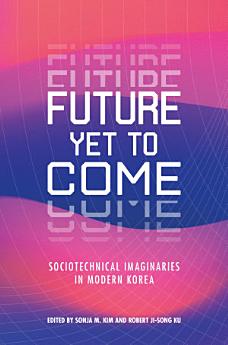Future Yet to Come: Sociotechnical Imaginaries in Modern Korea
Sonja M. Kim · Robert Ji-Song Ku
Sep 2021 · University of Hawaii Press
Ebook
284
Pages
family_home
Eligible
info
reportRatings and reviews aren’t verified Learn More
About this ebook
South Korea is home to cutting-edge electronics, state-of-the-art medical facilities, and ubiquitous high-speed internet. The country’s meteoric rise from the ashes of the Korean War (1950–1953) to rank among the world’s most technologically advanced societies is often attributed to state-led promotion of science and technology in nation-building projects. With chapters that discuss Korea’s dynastic past, foreign occupations, Cold War geopolitics, postwar rehabilitation in the twentieth century, and the contemporary neoliberal moment, Future Yet to Come argues that a longer historical arc and broader disciplinary approach better elucidate these transformations. The book’s contributors illuminate the “sociotechnical imaginaries” that promoted, sustained, and contested Korea’s scientific, medical, and technological projects in realizing desired futures.
Focusing special attention on visual culture and the life sciences, the essays present competing visions held by individuals and institutions of power in the use and purpose of scientific engagements. They demonstrate Korean specificities in culture and language, and the myriad social, political, spatial, and symbolic arrangements that shaped incorporations of and changes to existing systems of knowledge and material practices. Whether discussing moral epistemologies, imperialist or developmentalist thrusts in public health regimes, or new configurations of the “self” enabled by bio industries and media technologies, the book expands both the regional and global understanding of translation, accommodation, and transfer. Tracing imaginaries across the vicissitudes of Korea’s past recalls their history and makes visible their shifts and resilience in dynamic political economies.
Future Yet to Come reminds us how deeply intertwined science, medicine, and technology are to not only our polities, corporations, and societies but also the human condition. Bridging histories of science and medicine with anthropologies of technology and the arts, the book will appeal to students and scholars of Korean and East Asian studies as well as those with interests in the comparative history of medicine, STS (society and technology studies), art history, media studies, transnationalism, diaspora, and postcolonialism.
Focusing special attention on visual culture and the life sciences, the essays present competing visions held by individuals and institutions of power in the use and purpose of scientific engagements. They demonstrate Korean specificities in culture and language, and the myriad social, political, spatial, and symbolic arrangements that shaped incorporations of and changes to existing systems of knowledge and material practices. Whether discussing moral epistemologies, imperialist or developmentalist thrusts in public health regimes, or new configurations of the “self” enabled by bio industries and media technologies, the book expands both the regional and global understanding of translation, accommodation, and transfer. Tracing imaginaries across the vicissitudes of Korea’s past recalls their history and makes visible their shifts and resilience in dynamic political economies.
Future Yet to Come reminds us how deeply intertwined science, medicine, and technology are to not only our polities, corporations, and societies but also the human condition. Bridging histories of science and medicine with anthropologies of technology and the arts, the book will appeal to students and scholars of Korean and East Asian studies as well as those with interests in the comparative history of medicine, STS (society and technology studies), art history, media studies, transnationalism, diaspora, and postcolonialism.
About the author
Sonja M. Kim (Editor)
Sonja M. Kim is associate professor of Asian and Asian American studies at Binghamton University of the State University of New York.
Robert Ji-Song Ku (Editor)
Robert Ji-Song Ku is associate professor of Asian and Asian American studies at Binghamton University of the State University of New York.
Sonja M. Kim is associate professor of Asian and Asian American studies at Binghamton University of the State University of New York.
Robert Ji-Song Ku (Editor)
Robert Ji-Song Ku is associate professor of Asian and Asian American studies at Binghamton University of the State University of New York.
Rate this ebook
Tell us what you think.
Reading information
Smartphones and tablets
Install the Google Play Books app for Android and iPad/iPhone. It syncs automatically with your account and allows you to read online or offline wherever you are.
Laptops and computers
You can listen to audiobooks purchased on Google Play using your computer's web browser.
eReaders and other devices
To read on e-ink devices like Kobo eReaders, you'll need to download a file and transfer it to your device. Follow the detailed Help Center instructions to transfer the files to supported eReaders.




